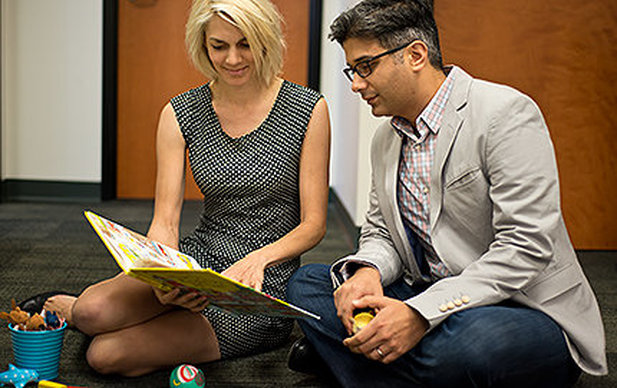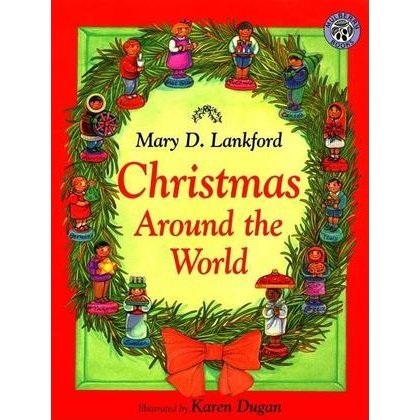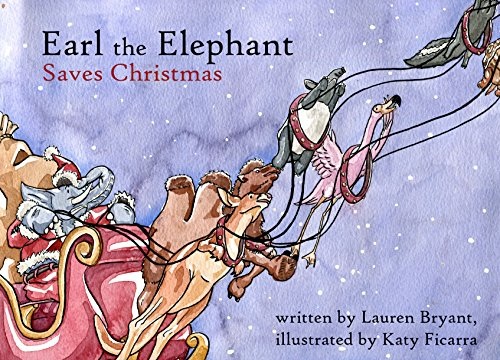|
Fun fact: the other day, some crazy lady on the internet went haywire (or should I say... sleigh-wire?) at me because of a Facebook comment... about Santa. It wasn't the kind of "holiday cheer" I normally feel this time of year... but it did make me chuckle.
It also made me think -- should parents tell their kids about Santa? And as a psychologist, I'm pretty sure the answer is yes. Here's why: 1. Your kids will never be able to interact with magical and fantastical stories the way they can now... ever again. It's well-documented that fantasy play is super important for your child's development. It's so important that they have a natural desire to do it. And when they do fantasy play, they learn at least as much (but probably more) as they do in school. Except school is something they have to do, and pretend play is something they want to do. Kids' imaginations are so wild and so complex, in fact, that computer scientists are studying their play behavior to develop artificial intelligence that is capable of counterfactual reasoning. But that's another story.
This is how the experts do computer science now. USC's Henrike Moll (left) and Morteza Dehghani use these books and toys to interview children and learn how humans create alternative worlds to make decisions. Photo by Peter Zhaoyu Zhou.
There is no other time in their life when they will be able to suspend disbelief the way they can now. Sure, they can visit a haunted house as an adult, and the actors might manage to startle them... But they will never actually believe they're in a haunted graveyard or serial killer's barn or whatever. 2. As experts at imaginary play, kids who eventually "discover" Santa isn't real won't think you lied to them. The internet lady who flipped her lid at me was mad because she considers talking about Santa to be "lying" to your kids, permanently destroying the trust between parent and child. Which is crazy because, first of all, find me ONE person, anywhere, who doesn't trust their parents because of Santa. (Hint: if you're that person -- the one who still feels hurt and betrayed because of Sants... you're the one with the problem.) But it also reflects a fundamental misunderstanding (or disunderstanding?) of developmental psychology. Because their fantasy lives are so rich and varied, a child who eventually discovers that Santa isn't real isn't going to think you've lied to them -- they're going to think that you were playing with them. Think about it. Do they think they're "lying" to you when they pretend to be a puppy? Are they "lying" to their dolls when they pour imaginary tea into their cups? Are they "lying" when they say the banana is a phone (or, in my case, that the Lego was a Dalmatian)? No. Definitely not. When you talk to your kids about Santa, you are creating a beautiful fantasy for them. You're doing a lot more than just playing with them. It is probably the most you will ever be able to "bring a story to life." And it's not just any story. It's a touching story of hard work, generosity, and an interconnected global community. 3. Santa, Rudolph, and their crew present a unique opportunity for you to see into (and develop!) your child's mind. A real-life story is a wonderful way to see into your child's mind and get them asking questions and posing hypotheses about physics, engineering, geography, and other cultures. You can learn a lot about how your child thinks by asking them how Santa could possibly visit millions of children, all over the world, in just a few hours. Or how they think the reindeer fly. Or how much they think Santa's sleigh weighs. You can support them with charming and memorable Christmas books that help them grow their kindness and cultural curiosity. For example, in Mary Lankford's Christmas Around the World teaches your children about Ethiopian fringed umbrellas; star-shaped Filipino parol lanterns; candlelit Swedish St. Lucia crowns; and more.
National Geographic Kids also has a wonderful book called Holidays Around the World: Celebrate Christmas With Carols, Presents and Peace that will help your child take a step out of their own head, and imagine life on the other side of the planet.
Not to mention the countless Christmas stories about generosity, kindness, empathy, and the joy of giving.
Or even the Christmas stories about courage and leadership. Rudolph was the loner everyone made fun of -- but then he stepped up and saved Christmas. It's a great, inspiring story. Believing it's real makes it all the more inspirational. Another fun lesson in resilience, leadership and unity comes in the form of Earl the Elephant Saves Christmas, by Lauren Bryant and gorgeously illustrated by Katy Ficarra. 4. Santa isn't "just about presents" -- and if he is, that's because you're doing something wrong. Santa represents so many things. I've already talked about hard work and generosity and unity. But he also teaches a valuable lesson in self-regulation and delay of gratification -- which, as world-renowned psychology Walter Mischel wrote in The Marshmallow Test: Why Self-Control is the Engine of Success, are two of the most important skills you can possibly teach your child. Groundbreaking research in 2010 found that self-control is like a muscle -- when you use it a lot, you get tired, and become "ego depleted." But if you keep using it a lot over time, it grows. For extra mileage, continue practicing delay of gratification on Christmas morning. In my family, we always opened presents one at a time. I would go, then my sister would open one, then my brother would. It was in no way a "free for all." No matter how excited you were to find out what was in the big box, you had to wait. Moreover, we didn't just rip off the paper -- we would read the card, if there was one, or the To: From label, if there wasn't. Then, we would say, "Thanks, Santa/Grandma/Gift Giver," even if they weren't there -- both before and after opening the present. Which leads me to my next point: Santa is also a vehicle for developing your child's gratitude -- a life skill that is highly predictive of happiness. Gratitude is more important than self-esteem, and it's more important than being able to do flashcards (no matter how fast your kid is, computers will always be better). Santa is a role-model when it comes to selflessness (his work is hard, and entirely unpaid) and finding joy in giving. Sure, it's fun to get presents -- but Santa reminds us how exciting it is to make, find, or buy a present for someone else. Which... is another valuable life lesson. Studies show that spending money on someone other than yourself makes you happier, and this is important to know in an increasingly materialistic (and increasingly depressed) world. Speaking of materialism... if you truly think that presents = materialism, you're doing it wrong. As I wrote in If You Think Christmas is "Commercialized," I Think YOU are Uninspired, presents shouldn't about giving people things. They should be about experiences and opportunities. Opportunities to explore new games and activities that could enrich your learning -- and even become your genius. Opportunities to read new books, which might spark a curiosity that sets you apart from your peers. Or even just an opportunity to spread joy -- to show someone, "I've seen into your soul, and here's what I think you'll really like." It's about enabling people to play their own music, create their own art, make their body stronger, make their mind sharper, or have more experiences that take their breath away. So. If you use Santa as a "bribe," or think he's "just about presents," you're doing it wrong. Instead, Santa should be a tool for children to monitor their own behavior and expand their social, emotional, and cognitive skills. *** Psychology research aside... is there really something so terrible about participating in a fantasy with your child? Is there really something wrong with spending a few years believing in something that makes the holidays wonderful and magical?
4 Comments
Jessica
12/15/2016 08:17:11 pm
I always thought the whole thing was stupid (I mean, I knew as a kid that Santa wasn't real) but this makes me rethink that. Good post.
Reply
Linda
2/1/2017 06:32:22 am
Great post, thanks for it!
Reply
2/4/2017 09:13:00 am
That is SO sweet! I love that story -- thanks for sharing!
Reply
Leave a Reply. |
About the Author

Eva is a content specialist with a passion for play, travel... and a little bit of girl power. Read more >
Want to support The Happy Talent? CLICK HERE!
Or Find me on Patreon!
What's Popular on The Happy Talent:
Trending in Dating and Relationships:
What's Popular in Science: Playfulness and Leisure Skills:
Popular in Psychology and Social Skills:
Categories
All
|
































 RSS Feed
RSS Feed